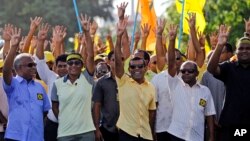MALE —
The Maldives holds a run-off presidential election on Saturday that the Indian Ocean archipelago's 240,000 voters hope will end two years of political turmoil.
Three previous attempts to elect a new leader have been annulled or postponed in as many months, as election favorite Mohamed Nasheed and the parliament have clashed with a political old guard backed by the Supreme Court.
Nasheed, who became the Maldives' first democratically elected president in 2008, left office last year in what he says was a coup. He won 47 percent of first round votes a week ago, short of the 50 percent needed to avoid a run-off.
He is up against Abdulla Yameen, a half-brother of Maumoon Abdul Gayoom, who ruled the holiday island paradise for 30 years and is considered a dictator by opponents and rights groups.
The term of the incumbent president, Mohamed Waheed, expired on November 11, but when the Supreme Court delayed the second round of voting following demands by Nasheed's rivals, Waheed extended it to fill a constitutional void.
Waheed left for Singapore on Friday, saying: “I do not think there is much I can do from here, things that I cannot do over the phone.”
The political upheavals and sporadic violent protests in the capital Male have hit tourism, a vital source of foreign currency, notably resulting in the Maldives being unable to import all the fuel it needs.
Islam central to campaigns
Political analysts say the crisis may not pass even if Saturday's vote goes smoothly, after a bitter election campaign centring on the future role of religion in a largely Muslim state where Islamist ideology is on the rise.
Addressing a final rally on Thursday, Nasheed said his opponents were using Islam as a weapon, after they accused him and his Maldivian Democratic Party (MDP) of being too secular and close to Western countries.
“I assure you, there will not be any room for another religion in this country as long as we draw breath,” he said.
An MDP government would “build a completely new nationhood based on Islam, human rights, social security and economic opportunity”, he added.
Yameen, who has the backing of resort tycoon Gasim Ibrahim, who was eliminated in the first round of voting, attacked the United States and others for criticizing the Maldives' election process.
“When you go to vote, think for yourselves,” he said. “Do you want Islam in the Maldives or do you want to allow space for other religions in the Maldives? Vote on whether to allow foreigners to interfere in the Maldives or not.”
The European Union said it was ready to consider “appropriate measures” if Saturday's poll did not bring the process to a successful conclusion, but did not specify what they might be.
Three previous attempts to elect a new leader have been annulled or postponed in as many months, as election favorite Mohamed Nasheed and the parliament have clashed with a political old guard backed by the Supreme Court.
Nasheed, who became the Maldives' first democratically elected president in 2008, left office last year in what he says was a coup. He won 47 percent of first round votes a week ago, short of the 50 percent needed to avoid a run-off.
He is up against Abdulla Yameen, a half-brother of Maumoon Abdul Gayoom, who ruled the holiday island paradise for 30 years and is considered a dictator by opponents and rights groups.
The term of the incumbent president, Mohamed Waheed, expired on November 11, but when the Supreme Court delayed the second round of voting following demands by Nasheed's rivals, Waheed extended it to fill a constitutional void.
Waheed left for Singapore on Friday, saying: “I do not think there is much I can do from here, things that I cannot do over the phone.”
The political upheavals and sporadic violent protests in the capital Male have hit tourism, a vital source of foreign currency, notably resulting in the Maldives being unable to import all the fuel it needs.
Islam central to campaigns
Political analysts say the crisis may not pass even if Saturday's vote goes smoothly, after a bitter election campaign centring on the future role of religion in a largely Muslim state where Islamist ideology is on the rise.
Addressing a final rally on Thursday, Nasheed said his opponents were using Islam as a weapon, after they accused him and his Maldivian Democratic Party (MDP) of being too secular and close to Western countries.
“I assure you, there will not be any room for another religion in this country as long as we draw breath,” he said.
An MDP government would “build a completely new nationhood based on Islam, human rights, social security and economic opportunity”, he added.
Yameen, who has the backing of resort tycoon Gasim Ibrahim, who was eliminated in the first round of voting, attacked the United States and others for criticizing the Maldives' election process.
“When you go to vote, think for yourselves,” he said. “Do you want Islam in the Maldives or do you want to allow space for other religions in the Maldives? Vote on whether to allow foreigners to interfere in the Maldives or not.”
The European Union said it was ready to consider “appropriate measures” if Saturday's poll did not bring the process to a successful conclusion, but did not specify what they might be.





